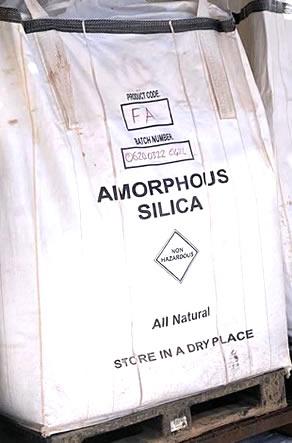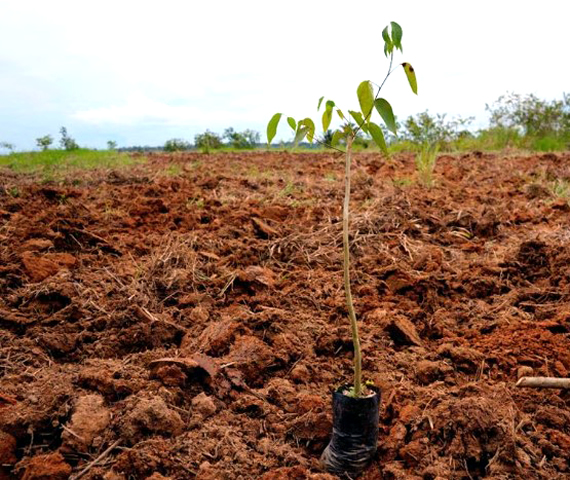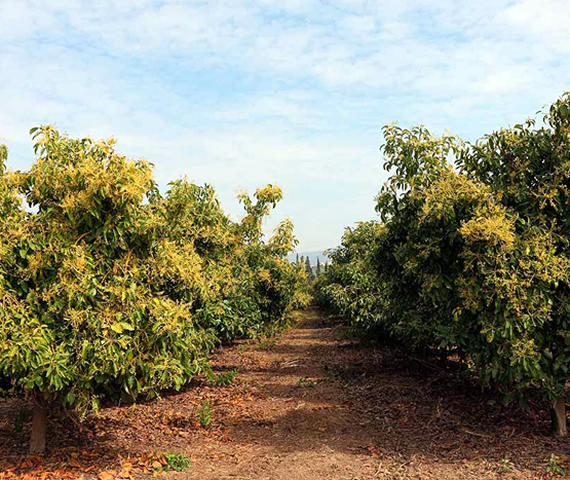Silica particles have a high surface area and can adsorb and hold onto water and nutrients, making them available for plants over an extended period. This helps in reducing water stress and nutrient leaching, especially in sandy soils.
Agriculture & Farming
Using Mineral Magic, we had noticeable increased root development and drought tolerance during the development of our crop and that resulted in a 12.6% increase in yield on top of a record Barley crop. Our daughter Claire, dug up a plant out of the treated and untreated section and left them on the trailer. The treated plant was green for a few weeks whereas the untreated one shrivelled up in a few days.
Alex & Sue Stevens
Famers
Nth Tammin


Broadacre Crops
Amorphous silica offers multifaceted benefits to broadacre farms cultivating wheat, canola, and barley in Australia. Scientifically, it plays a pivotal role in enhancing soil health and crop productivity.
Silica particles aid in water and nutrient retention, promoting optimal moisture levels for these crops. Furthermore, they mitigate soil salinity, crucial in regions prone to salinity issues. Silica’s amorphous structure fosters root development, improving nutrient uptake. This, in turn, enhances plant vigor and resistance to environmental stressors. In the pursuit of sustainable agriculture, harnessing the technical advantages of amorphous silica becomes imperative, ensuring healthier plants and sustainable yields.
Key Benefits
Mineral Magic for Broadacre Crops.
Amorphous silica can increase the availability of essential nutrients in the soil. It acts as a carrier for nutrients like potassium and calcium, preventing their leaching and making them more accessible to plant roots. This can lead to improved nutrient uptake by crops.
Silica can help plants become more resilient to drought conditions. It does so by promoting the development of stronger cell walls and increasing the plant’s ability to retain water. This is especially beneficial in areas with erratic rainfall patterns.
Silica can bolster the natural defences of plants against pests and diseases. It forms a physical barrier on the plant’s surface, making it harder for pests to feed and reducing the risk of fungal infections.
Amorphous silica can improve the overall stress tolerance of crops. This includes resistance to environmental stresses such as frost, high temperatures and salinity. It helps maintain cellular integrity under adverse conditions.
The improved nutrient availability, water retention, and stress resistance often translate into increased crop yields. Additionally, the enhanced quality of the produce, such as better grain quality in wheat and oil content in canola, can be observed.
Silica can help mitigate the harmful effects of soil salinity. It improves the soil’s ability to flush excess salts through leaching and reduces the impact of salt stress on crops.
It can act as a pH buffer in the soil, helping to stabilize pH levels. This is essential for optimal nutrient uptake by plants, as most nutrients are more readily available in a specific pH range.
Contact us


Carbon Offset Crops
Amorphous silica, plays a pivotal role in enhancing carbon offset tree plantings through its unique properties. Scientifically, it promotes soil health by improving its structure and porosity, facilitating better root growth and nutrient uptake for trees. This translates to increased tree growth rates, enabling faster carbon sequestration.
Additionally, amorphous silica aids in mitigating soil salinity, a critical factor in arid regions like Australia, ensuring tree survival. Its water and nutrient retention capabilities reduce irrigation needs, conserving water resources. In sum, amorphous silica contributes to sustainable tree plantations, fostering effective carbon offset initiatives and supporting Australia’s commitment to combat climate change.
Key Benefits
Mineral Magic for Broadacre Crops.
Amorphous silica can enhance soil structure by increasing its stability and preventing compaction. This, in turn, promotes better root growth and development, which is crucial for the establishment and growth of trees.
Silica has a high cation exchange capacity (CEC), which allows it to hold onto essential nutrients like potassium and calcium. This ensures that these nutrients remain available to tree roots over an extended period, supporting healthy growth.
Amorphous silica can absorb and retain moisture in the soil. This is particularly valuable for tree plantings as it helps to ensure consistent water availability to the trees, reducing the risk of drought stress.
In areas with high salinity, amorphous silica can help mitigate the adverse effects of salt on tree growth. It can prevent salt buildup in the root zone, thus improving the overall health and vitality of the trees
Carbon offset tree plantings aim to sequester carbon dioxide from the atmosphere. By promoting healthier tree growth through improved soil health and nutrient retention, amorphous silica can potentially enhance the carbon sequestration capacity of these trees.
Silica can enhance the availability of other essential minerals in the soil, such as calcium and magnesium, which are important for overall tree health.
Silica can also enhance the natural resistance of trees to various diseases and pests. This can result in healthier trees with reduced reliance on chemical treatments.
The effects of amorphous silica in the soil can last for an extended period, providing ongoing benefits to tree plantings. This long-lasting impact can contribute to the sustained success of carbon offset initiatives.
More Information
For best application rates and a cost calculation, try our easy to use calculators!


Vegetables
Amorphous silica, such as that found in Mineral Magic, plays a pivotal role in enhancing commercial vegetable farming. This scientifically-proven soil amendment offers multifaceted benefits. Firstly, it improves soil structure by preventing compaction and enhancing aeration, crucial for root development. Secondly, amorphous silica aids in water and nutrient retention, reducing irrigation requirements and nutrient leaching, which is economically and environmentally significant. Thirdly, it acts as a natural defense against salt stress, particularly relevant in Australian agriculture.
This mineral contributes to healthier, more robust plants, ultimately increasing crop yields and bolstering sustainable horticulture, aligning perfectly with the ethos of prioritizing soil health in agriculture.
Key Benefits
Mineral Magic for Vegetables.
Amorphous silica can enhance soil structure by increasing its porosity and aggregation. This allows for better root penetration, aeration, and water infiltration, which are crucial for healthy plant growth.
Silica strengthens plant cell walls, acting as a physical barrier against pathogens. It can also activate the plant’s defence mechanisms, making it more resistant to diseases and pests. This can reduce the need for chemical treatments.
In regions with saline soils, amorphous silica can mitigate the harmful effects of salt by binding with sodium ions and reducing soil salinity. This is particularly important for vegetable crops sensitive to salt stress.
Silica is involved in the formation of chloroplasts, which are crucial for photosynthesis. Adequate silica levels can improve a plant’s ability to capture and use light energy, leading to increased growth and productivity.
Amorphous silica can help plants tolerate various environmental stresses, including drought, heat, and heavy metal toxicity. It acts as a buffer, reducing the negative impacts of these stressors.
Silica can enhance the uptake of essential nutrients, such as calcium and potassium, by plants. This can result in better nutrient utilization and overall plant health.
The combination of all these benefits often leads to increased crop yields and improved quality of vegetables. This is particularly important for commercial farms aiming to maximize their profits.
Focusing on soil health through the use of amorphous silica can promote sustainable agriculture practices by reducing the reliance on chemical inputs and minimizing environmental impacts.
More Information
For best application rates and a cost calculation, try our easy to use calculators!


Fruit/Trees
Amorphous silica, a key component of products like Mineral Magic, offers significant benefits to commercial orchards in Australia and around the world. Its unique properties contribute to improved soil health, thereby enhancing orchard productivity and sustainability.
Scientifically, amorphous silica enhances soil structure, aiding in water and nutrient retention. This is crucial for orchards, as it ensures consistent hydration and nutrient availability for fruit trees. Moreover, amorphous silica mitigates salt-related issues, which can be detrimental to orchard health.
In the context of commercial orchards, the technical advantages of amorphous silica translate into healthier plants, increased yields, and sustainable agricultural practices. By prioritizing soil health through the incorporation of amorphous silica, orchard owners can optimize fruit production and contribute to the long-term viability of their operations.
Key Benefits
Mineral Magic for Fruit/Trees.
Amorphous silica can enhance soil structure by promoting aggregation, reducing compaction, and increasing porosity. This improves root growth and allows for better water infiltration and air circulation in the soil.
Silica’s ability to hold moisture in the root zone can be especially beneficial in arid or drought-prone regions. It helps orchards maintain adequate soil moisture levels, reducing the risk of water stress in plants even in hydrophobic soil types.
Silica can act as a cation exchange medium, holding onto essential nutrients such as calcium, magnesium, and potassium. This can prevent nutrient leaching and make these nutrients more available to orchard trees.
Silica strengthens cell walls in plants, making them more resistant to diseases and pests. This can reduce the need for chemical pesticides and fungicides, promoting sustainable orchard management.
In regions with high salinity in the soil, amorphous silica can help mitigate salt stress. It acts as a buffer, reducing the harmful effects of excess salts on plant roots.
Healthier trees with improved nutrient uptake and disease resistance tend to produce higher yields of better-quality fruits. This can have a positive impact on the commercial viability of orchards.
The use of amorphous silica as a soil amendment can contribute to long-term soil health and sustainability. It helps maintain balanced soil conditions and reduces the need for frequent soil amendments.
Sustainable orchard practices, such as using amorphous silica, align with environmentally friendly agriculture. They reduce the environmental impact associated with chemical fertilizers and pesticides.
More Information
For best application rates and a cost calculation, try our easy to use calculators!


Viticulture
Amorphous silica, a key component of my product, Mineral Magic, offers substantial benefits to commercial vineyards when employed as a soil amendment. Scientifically, its porous structure enhances water and nutrient retention in the soil, promoting healthier vine growth.
Silica’s unique properties also aid in mitigating salt buildup, crucial for vineyard sustainability. This technical advantage ensures a balanced soil environment, reducing the stress on grapevines. Furthermore, amorphous silica fosters optimal root development, enhancing nutrient uptake and overall vine health. In the pursuit of sustainable viticulture, the incorporation of Mineral Magic, rich in amorphous silica, proves to be a valuable and scientifically sound choice for vineyard operators in Australia.
Key Benefits
Mineral Magic for Viticulture.
Amorphous silica can enhance soil structure by increasing its porosity and water-holding capacity. This improved soil structure allows for better root penetration and aeration, which are crucial for vine growth.
Silica has a high cation exchange capacity (CEC), meaning it can adsorb and release essential nutrients for plant growth. This property helps in nutrient retention in the root zone, making vital elements like potassium, calcium, and magnesium more available to vines.
Silica strengthens cell walls in plants, making them more resistant to diseases and pests. This can be particularly beneficial in vineyards where fungal diseases like powdery mildew can be problematic.
Silica can improve photosynthesis in plants by increasing chlorophyll production. This results in better utilization of light energy, leading to increased vine growth and potentially higher grape yields.
Amorphous silica can enhance the water-holding capacity of soils, allowing vines to withstand periods of drought more effectively. It helps in water retention around the roots, ensuring a steady supply of moisture during dry spells.
The addition of silica to the soil can help reduce soil erosion, which is essential for maintaining the long-term sustainability of vineyards.
In areas with salinity issues, amorphous silica can assist in mitigating salt stress by promoting ion exchange and reducing sodium absorption by plant roots.
Silica can act as a pH buffer, helping to maintain soil pH within an optimal range for vine growth.
Healthy grapevines with access to essential nutrients and proper moisture levels tend to produce higher-quality grapes. This is crucial for vineyards aiming to produce premium wines.
More Information
For best application rates and a cost calculation, try our easy to use calculators!